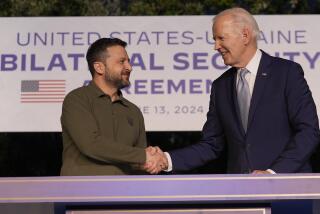U.S., Russia -- a little thaw
At the first U.S.-Russian summit in seven years, President Obama and Russian President Dmitry Medvedev agreed to agree. This is a far greater accomplishment than it might seem, given the sorry state of bilateral relations that the two leaders inherited and the high costs of discord. The presidents established a framework for reducing their nuclear arsenals and signed an agreement giving the U.S. rights to fly military supplies across Russia to Afghanistan. More broadly, they chose to focus on areas of common interest rather than on the serious issues that divide the two countries. And while goodwill is not sufficient for resolving bilateral problems, it is an essential ingredient.
Consider some of the sources of bad blood in recent years: U.S. support for Kosovo’s independence from Serbia; the expansion of the North Atlantic Treaty Organization into former Soviet republics along Russia’s border; U.S. backing for Georgia over Russia in last year’s conflict in the breakaway republic of South Ossetia. Russia has been enraged by U.S. plans to put missile defense batteries and radar in neighboring Poland and the Czech Republic; the United States, in turn, was irked by Russian pressure on Kyrgyzstan to evict the U.S. military from a base used for the war in Afghanistan, and has been critical of Russia’s crony capitalism and lack of democracy. Against this backdrop, Monday’s meeting was a success.
The agreement of the two presidents to cut deployed nuclear warheads from the range of 1,700-2,200 each to 1,500-1,675 each, and to reduce delivery systems, sets the stage for negotiations to replace the 1991 Strategic Arms Reduction Treaty that expires in December. This is a far more modest goal than we would have liked, but perhaps the numbers are less important than the goal itself. The two sides renewed their commitment to pursuing nuclear arms reduction, and that’s what matters.
The leaders also agreed to keep open lines of communication. This is key because opportunities for misunderstanding are many and difficult issues lie ahead. Obama today is to face Prime Minister Vladimir V. Putin, whom he last week accused of adhering to an “outdated” Cold War relationship. He’ll push for democracy in meetings with leaders of the private and nonprofit sectors, a move that likely will be regarded by the Kremlin as meddling. Meanwhile, the Russians will want to discuss the U.S. role in Georgia and U.S. plans for a missile defense system. The United States wants Russia’s help reining in the nuclear ambitions of North Korea and Iran.
The disengagement of the last seven years saw a terrible deterioration in relations. Now, both sides stand to benefit from engagement.
More to Read
Sign up for Essential California
The most important California stories and recommendations in your inbox every morning.
You may occasionally receive promotional content from the Los Angeles Times.










